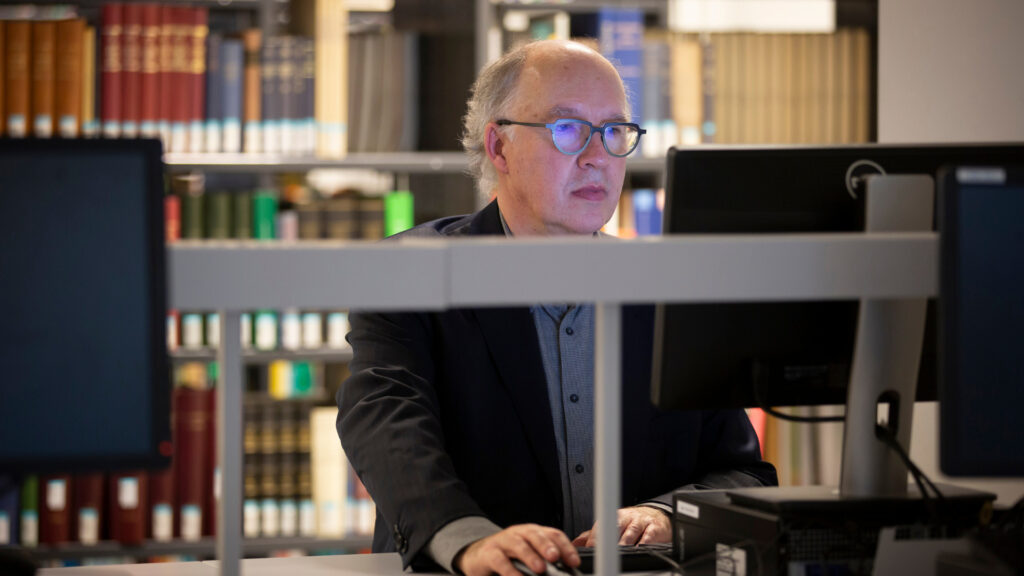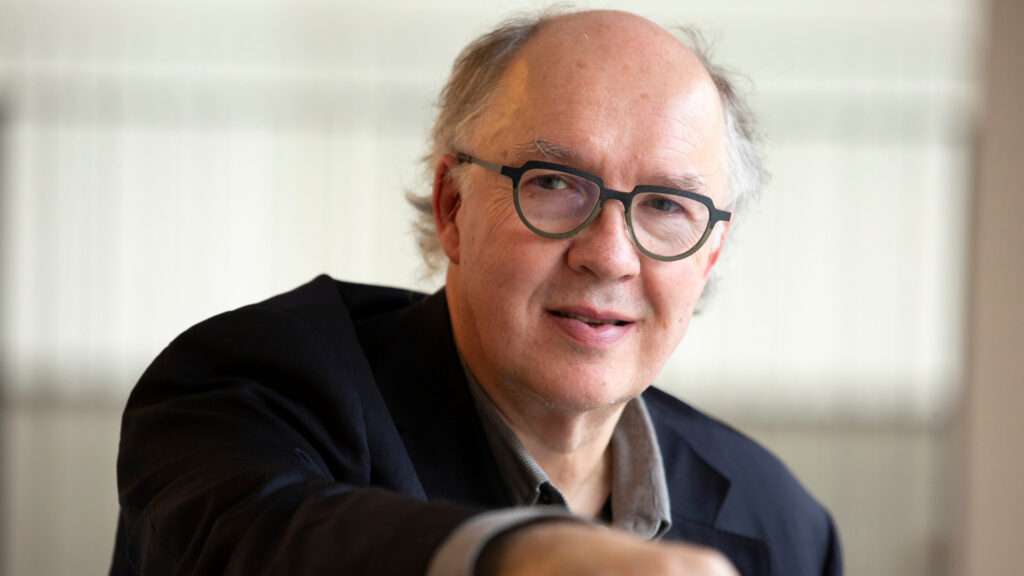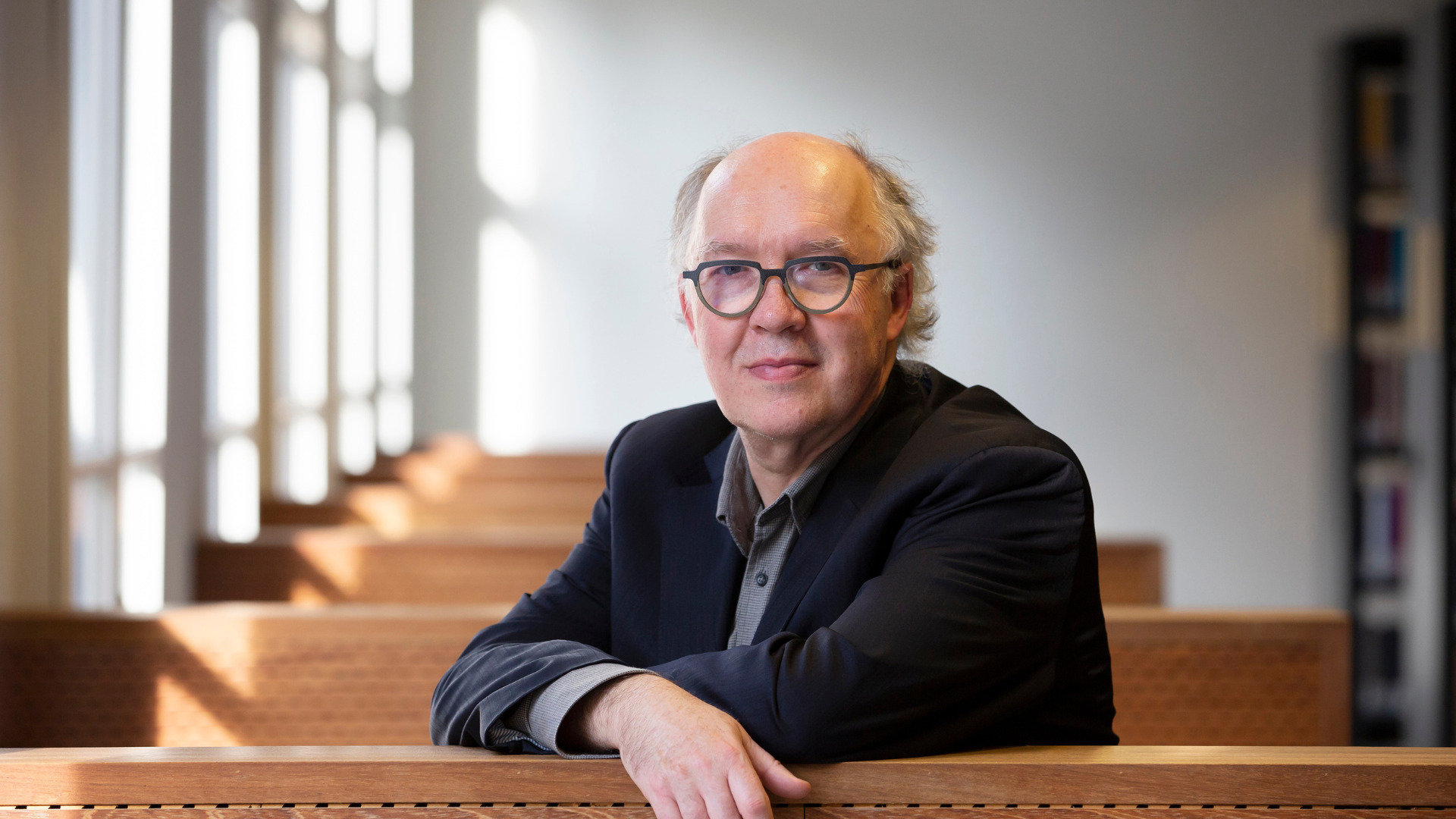Since the beginning of this academic year, our Library and Archives Department has had a new head of department and with it a new head librarian: Rik Van Daele. After all, his predecessor, Trudi Noordermeer, has retired. Rik has now been on the job as head of department for six months, so time for an introduction in five questions.
What are your goals at the university library?
Rik Van Daele: ‘I think libraries are the concrete slab of any community, at any level. I hope our library can fulfil that role for the University of Antwerp. A library is often called “the third place”, alongside “the workplace and the home”, or “the classroom and the student room”. It is a grateful complement to those other spaces: a place of rest and a meeting place, a source of knowledge, a place of study and a quiet place. I think it is especially important to show what we can signify and do as a library. I would like to play an even greater role in education, offering more workshops and guest lectures on library skills, search skills, language and reading skills. What else can the library strengthen? That’s a role I would like to see expanded further: more structured contact with students and faculties.’
‘Introducing myself in five words? Fox hunter – passion for teaching/lecturing – cultural person – connector – scientist.’
Rik Van Daele – Head of Library Department
Ambitions
Rik Van Daele: ‘We opened our art depot in February, where “Art on Campus” will have a permanent home and the University of Antwerp’s fantastic art collection will get the appreciation it deserves. For instance, we recently acquired a fragment of a still unknown Middle Dutch chivalric romance. Something like this should be highlighted a bit more. And we would also like to play a role in the “remake” of the Campus Drie Eiken library. Soon, a campus 2.0 will take shape there with a new student hall of residence, a new sports hall and student restaurant. The ideal time to tackle the library there too, following the example of De Parabool, the attractive learning centre on Campus Middelheim. We should take a look at how to turn that into a pleasant medical library, with practice rooms, quiet areas and meeting areas.’
What do you particularly want to commit to?
Rik Van Daele: ‘I want to commit to engaging even more intensely with our stakeholders, and in particular our users: the students, researchers and faculties, who structurally fund library operations. But we also want to make the institution more solid with sound policy planning, structured consultation through the Library Board, and the faculty library collections. I would like to revive the Library Board as it is an ideal channel to engage with our stakeholders. And I also would like to consult with the various faculty library committees to hear their questions and to see how we can support them.’

Open Science and Open Access
Rik Van Daele: ‘Cost control through lobbying in the right place is also an important goal. And creating realistic expectations of what we can do. After all, as a university library, we are only a small link in the chain and only have a modest influence on European policies around “open access & open science”. It is very important to engage with researchers who want to make information available as well as find it, but we should also be aware of the more difficult affordability of information caused by some global players.’
‘We are looking for motivated ambassadors among professors to help champion the affordability of that “open access”. Fortunately, we are not alone in such battles, and we are part of a consortium with all Flemish universities to negotiate and to keep costs manageable. It is our job to direct politicians and policymakers on this. Above all, we must remain a high-quality guide.’
Ecosystem and well-being
Rik Van Daele: ‘What do I want to commit to next? To strengthening our library’s position in the local ecosystem of Antwerp’s cultural partners. And I also want to remain committed to the well-being of all our colleagues, as well as our users. Many students come to the library to study, and we are happy to offer them that warm meeting and resting place, but it should not remain a mere study place. We should use the opportunity to teach them how to use good sources, ask the right questions of the systems, find the right data. That is where we can and should add value.’
‘Cost control through lobbying in the right place is also an important goal. And creating realistic expectations of what we can do.’
Rik Van Daele – Head of Library Department
What do you take away from your predecessor, Trudi Noordermeer?
Rik Van Daele: ‘First of all, I look at the high-quality team, with my esteemed deputy Veronique Rega, who, among other things, manages Anet, a network of 25 academic libraries in the Antwerp and Limburg region. Trudi was also very committed to Anet and I want to keep that focus. We must accept that we are in a rapidly evolving world of upscaling. We have to make sure we remain competitive. This can be done by attracting good staff, but also by making stronger what is already strong.’
Structural subsidies
Rik Van Daele: ‘So I remain true to the general outlines of my predecessor: digital first, expanding the memory of UAntwerp, and working in function of education and research. Digital first: we absolutely must continue to go for that, but we must also remain aware of the vulnerability of that digital world, and continue to carefully monitor the digital-analogue balance. And besides that, I also want to give our archiving department its own place and make it even better. As a library, we are responsible for both inventory and valorisation. My ambition is to make the institution ready for structural Flemish project subsidies within the Cultural Heritage Decree in the next few years. Within five years, we want to submit and obtain a structural subsidy file.’
How would you introduce yourself in five words?
Rik Van Daele: ‘Fox hunter – passion for teaching/lecturing – cultural person – connector – scientist.’
‘I wrote my PhD thesis on Van den vos Reynaerde and, in my spare time, still edit – together with ten passionate editors – Tiecelijn, the yearbook of the Reynaert Society. The main focus is the study and promotion of the Reynaert story in the most general sense. For example, I am currently working on an article on four Antwerp paintings from the 17th century that have never been discussed before and underline Antwerp’s role as Reynaert’s city. In this way, I still remain a scientist above all else. A cultural person and connector was already apparent in my role in the cultural sector, and because I really enjoy lecturing and teaching, I feel at home among all these young people here.’

What is your previous employment and why did you choose the University of Antwerp?
Rik Van Daele: ‘I started my professional career in the university environment as an assistant and post-doctoral fellow at KU Leuven. From there, I went to local cultural policy. I was the only Fleming who had ever been both director of a cultural centre (Lokeren, Beveren, Sint-Niklaas) and librarian (Sint-Niklaas) and museum curator (Lokeren). In Sint-Niklaas, I was successively city librarian, director of the cultural centre, department head of Culture and cultural policy coordinator.’
Full circle
Rik Van Daele: ‘My daughter saw the job vacancy for head of department and said: “Dad, isn’t that something for you?” I had good contacts with some researchers and former colleagues, including Frank Willaert, Hubert Meeus, Ludo Simons, Annick Schramme and Marc Jacobs. And I also greatly admired the research of our Rector Herman Van Goethem and Professor Pierre Van Damme. So I decided to apply.’
‘I am now 60 years old. I read that between 55 and 65, only 1.7% of the population still changes jobs, so my job switch at this age is unusual. But I immediately felt at home in this world of research, among young people, and convinced that I can really make a difference here. I feel it has come full circle.’


